Search
Search Results
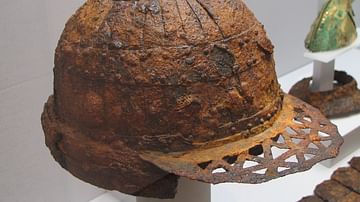
Image
Gaya Iron Helmet
An iron helmet from the Gaya confederacy (42-532 CE), Korea. 5th-6th century CE. (National Museum of Korea, Seoul, South Korea)
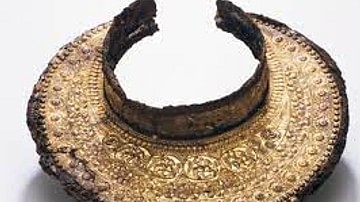
Image
Iron Peritrachelion (gorget) from Macedonian Tomb II of Vergina
Iron peritrachelion (gorget) with golden-silver decorative plate found in Macedonian Tomb II of Vergina, Imathia, Central Macedonia, Greece. The tomb is dated to between the end of the 4th century BCE and the beginning of the 3rd century...
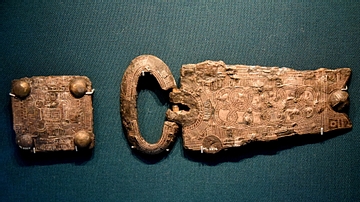
Image
Merovingian Iron Belt Buckle and Fitting
During the 600s CE, supplies of oriental garnets failed and gold and silver grew scarcer. As a result, Frankish jewelers turned to a decorative technique of inlaying designs and silver wire. These often imitated patterns used earlier in garnet...
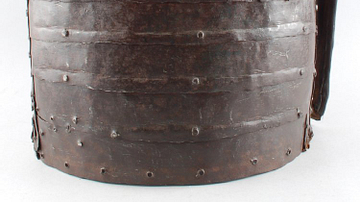
Image
Iron Corslet from Borno
An iron corslet from Borno in what is now Fika, Nigeria. The corslet was acquired by the British Museum in 1911, and is currently a part of the museum's collection.
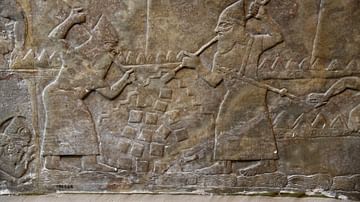
Image
Assyrian Soldiers with Iron Crowbars
Alabaster bas-relief depicting Assyrian soldiers using iron crowbars. Neo-Assyrian Period, 865-860 BCE. Detail of Panel 4 (bottom), Room B, the North-Palace Palace, Nimrud, modern-day Iraq. (The British Museum, London)
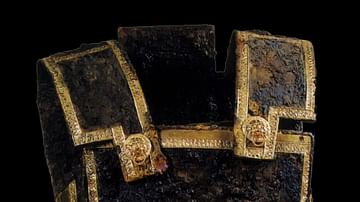
Image
Iron Core of Linothorax with Golden Buckles
Iron core of linothorax with golden buckles found in Macedonian Tomb II of Vergina, Imathia, Central Macedonia, Greece. The tomb is dated to between the end of the 4th century BCE and the beginning of the 3rd century BCE. Located at Archaeological...
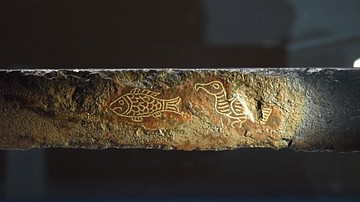
Image
Japanese Inlaid Iron Sword (Detail)
A detail of an inlaid iron sword. From Eta Funayama Tumulus, Nagomi-machi, Tamana-gun, Kumamoto, Japan. Kofun Period, 5th-6th century CE. National Treasure.
Tokyo National Museum.
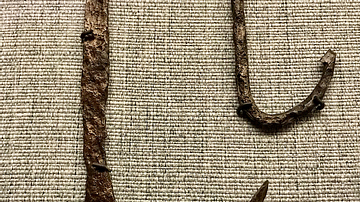
Image
Viking Iron Fishing Hooks
The Vikings did not use fishing reels or poles. Instead, they tied hooks to a fishing line made from sheep, cow, or walrus intestines, then pulled the fish up by hand. On a small rowing boat out on the open ocean, this was a very dangerous...
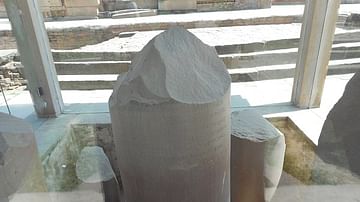
Image
Ashokan Pillar Base, Sarnath
Remains of an Ashokan Pillar in the Buddhist monastery around the Dharmarajika Stupa. The pillar has three inscriptions: the earliest is an Ashokan edict warning the monks and nuns of the monastery against quarrelling with each other, the...
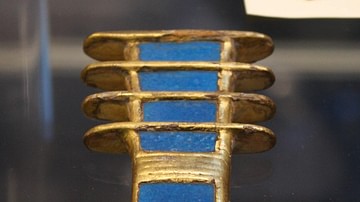
Definition
Djed
The djed is an ancient Egyptian symbol for stability which features prominently in Egyptian art and architecture throughout the country's history. `Stability' should be understood to mean not only a firm footing but immutability and permanance...